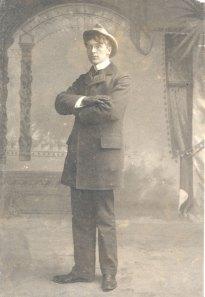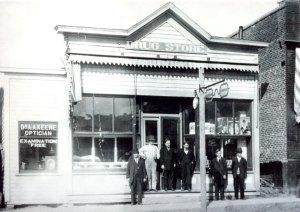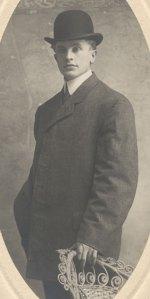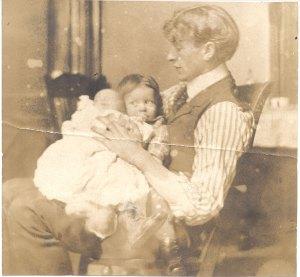
Herman Pauling, ca. 1899.
(Part 1 of 2)
The son of German immigrants, Charles Henry “Carl” Pauling – Linus Pauling’s paternal grandfather – joined his father and brothers during the Civil War by enlisting in Company E of the 45th Regiment of the Missouri Volunteers. After the war, Carl met Adelheit Blanken, who had come to Missouri with her family from Germany. They settled in Concordia, Missouri, where they had four children: the youngest, Herman Henry William, was born in 1876.
The following year, the family traveled to Biggs, California where they settled in a predominately German community. It was here where Herman’s sister, Anne Charlotte, was born. Herman and Anne would be the only two of Carl and Adelheit’s five children to survive into their twenties.
In 1882 the Paulings moved again, this time to Oswego, Oregon, near Portland. Here Carl worked as an iron monger at the largest foundry west of the Rockies. It was likewise in Oswego that Herman began to attend grammar school. By the tenth grade, in 1890, he had grown tired of school and dropped out, talking his way into an apprenticeship with a local druggist instead.

Condon drug store, early 1900s.
In the late 19th century, medicine not well regulated, leaving the door open for basically anyone to come along and make whatever claims they wished concerning the efficacy of their products. The druggist with whom Herman apprenticed taught him to avoid making wild statements and instead instilled in him the importance of the druggist’s responsibility to his customers. This professional ethic was closely bound to the practice of careful preparation of extracts, compounds, ointments, tinctures, oils and other products. By his nineteenth birthday, after several years apprenticing, Herman felt confident enough to move to Portland, where he found work at one of the largest pharmacies in the city.
The pharmacy, Skidmore Drug Company, employed Herman as a traveling salesman, his purview being a one-hundred mile area ringing Portland; he covered his turf by horse and buggy. After a financial depression hit the country in late 1893, Herman moved back to Oswego to run his own pharmacy. The depression led to the closing of Oswego’s massive foundry, pushing many to leave town, including the doctors and other druggists. Pretty soon Herman found that he was only person in town who could possibly care for the sick and his reputation quickly spread. The town was grateful for his skills and his caring disposition – as instilled by his mentor – in addition to the low fees that he charged for his consultations. If he was particularly concerned about them, Herman would commonly visit his patients well after their original appointment, making sure that their health had improved.
Herman’s reputation spread back to Portland as well, and investors there saw him as the perfect person to open up a drugstore in the small eastern Oregon town of Condon. By this time, regulations on drug sales had begun to increase, creating opportunities for those who were well-situated to meet the new standards and get in on the emerging market.

Herman Pauling, 1902.
Upon first arriving in Condon in the summer of 1899, Herman was not impressed. The town center consisted of six blocks along Main Street that ran right out into the desert and wheat farms. But by the fall, things began to look up. Just as in Oswego, his good reputation quickly grew and he became the featured guest at several town functions. The weekly newspaper, The Globe, described “Doctor” Pauling as “a registered, reliable and experienced druggist.”
He also began to attract the attention of some of the younger women in town. Goldie Stephenson, the oldest daughter of one of the area’s wealthier families, invited Herman over to her house to meet her sister Belle. The two immediately hit it off and soon could be seen talking to each other at many of the town’s community dinners and dances. By Christmas, Herman had proposed to Belle and she immediately accepted. Herman had business to attend to back in Portland soon after, and so had to be away from his fiancé for a brief time. This gave him the opportunity to express his love in letters. In a valentine that Herman wrote to Belle, he confided
Dear love, when life’s storms are raging fiercely I offer you my arms as your protection, and you can trust in their fond yet firm embrace. When in after years the cares of home and motherhood bear upon your mind you shall find me ever an able assistant and benefactor.
Herman even wrote her a poem:
A maiden fair with jet black hair/ Her heart beats kind and true/ She confides in me her every care/ This maid with eyes light blue.
Herman and Belle married on May 27, 1900 at the Congregationalist Church in Condon. (Herman was raised as a Lutheran, but was quite willing to adapt to Belle’s Congregationalist upbringing.) Trouble struck quickly however as, only weeks after the wedding, the Portland investors that had backed Herman’s initial move to Condon pulled out of the venture, leaving Herman scrambling to look for a new job. Herman had to settle for a clerk’s position at a pharmacy in Portland and the newlyweds found a small apartment near Chinatown.

The young father with his infant daughter, Pauline, and slightly older son, Linus. 1903.
Newly married, Herman worked as hard as he could to support his new bride. Meanwhile, the entertainment and shopping possibilities in Portland gave Belle new realms to explore that were unavailable in Condon. Belle was also pregnant when they arrived in Portland; Linus Carl Pauling, Belle and Herman’s first child, was born at the end of February 1901. Herman was thrilled to have a son and worked even harder to provide for his growing family. But this left Belle alone much of the time to take care of Linus on her own. Only nineteen years old, the young mother was still drawn to the possibilities of the city. But her feeling of being stuck with the children continued to grow as Pauline was born in August 1902, and Lucile on New Year’s Day 1904.
When Herman was home, he would take Linus for walks around the neighborhood to try to wear out the energetic toddler. The two wandered through the shops and Herman’s charismatic little boy drew the attention of neighborhood merchants who taught Linus to count to one-hundred in Chinese, a talent that garnered a measure of celebrity for the little boy as he displayed his counting skills for passersby. Belle sometimes joined Herman and Linus on their walks, and the family often visited a nearby water fountain.
Herman continued to look for a better job and eventually found one in Salem as a traveling salesman for the jeweler and druggist D. J. Fry. By October 1904, the family had moved into their new house in Salem. For his job, Herman traveled up and down the Willamette Valley, sometimes seventy miles in one day, still using a horse and buggy. With Herman away even more, Belle was left to care for the children in another new town, and she quickly made it known that she was not happy with their situation. In his correspondence with his wife, Herman’s replies are directed at a better future; one where he would own his own drugstore and could provide Belle with more luxury than she had thus far known in their married life.
